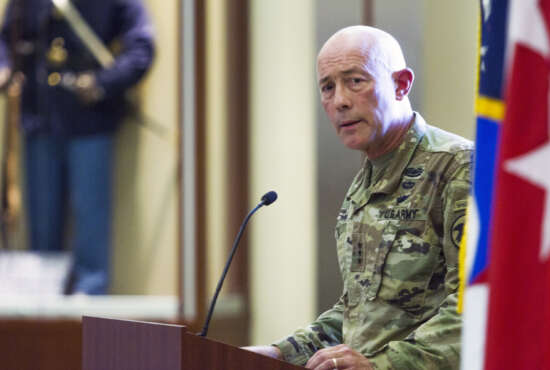Members of Congress want more transparency on troop movements
In today's Federal Newscast, some members of Congress want a deeper look into how the Defense Department is allocating its troops.
To listen to the Federal Newscast on your phone or mobile device, subscribe in PodcastOne or Apple Podcasts. The best listening experience on desktop can be found using Chrome, Firefox or Safari.
- Some members of Congress want a deeper look into how the Defense Department is allocating its troops. A bill was introduced in the House and Senate that will require DoD to report where and how it sends troops to meet operational needs each year. Representative Rob Wittman (R-Virg.), one of the sponsors of the bill, said the legislation is a way for Congress to ensure that the military is prioritizing China as a threat.
- One military service is getting rid of a classic exercise in its fitness test. The Marine Corps has thrown out crunches as part of its physical fitness test and replaced them with the plank. Planks were included as an option when doing the test in 2019, but now will be the only choice for Marines to show off their abdominal strength. The change will take effect in 2023. The Marine Corps said it’s making the adjustment to cut back on injuries, since crunches are tough on the lower back. Crunches have been part of the physical fitness test since 1997.
- The future workforce of the Defense Intelligence Agency will center on eight key factors. In a new strategic plan, DIA said it must create a digital workforce based on reskilling and upskilling programs. DIA will emphasize officer development training, empower diversity and inclusion and increase both competition and speed of hiring. The workforce component is one of four lines of effort outlined in the new strategic plan. The other lines of effort include creating an intelligence advantage, promoting a culture of innovation and ensuring long-term partners and alliances with the private sector and other allied nations.
- The Cybersecurity and Infrastructure Security Agency is hiring a chief people officer. CISA Director Jen Easterly said the new position will help the agency recruit and retain talented individuals amid a shortage of cybersecurity professionals across the nation. Easterly said the United States needs to launch an ambitious effort to build out its cyber workforce. CISA is working with schools on cybersecurity education, as well as colleges on a “Scholarship For Service” swap program to bring new talent into the agency. (Federal News Network)
- New rules for federal employees and government contractors around their vaccination status. Federal employees and governments contractors must fill out a form about their vaccination status and attest to the truthfulness of that information. New frequently asked questions from the White House say if an employee declines to answer about being vaccinated, they will be considered unvaccinated. If the employee is found to have lied on the form about being vaccinated, then they would violate the law about lying to the government. Contractors who decline to answer or who have not been vaccinated must show proof of a negative test in the last three days. Visitors to federal buildings also must show proof of vaccination status or a negative test in the last three days. (Federal News Network)
- Most of the National Science Foundation’s grant recipients kept essential research running through the COVID-19 pandemic, according to its inspector general. The IG said these projects continued, even as recipients generally followed guidance from the Office of Management and Budget to pay researchers unable to work because of pandemic restrictions. The IG also found award recipients donated surplus masks, gloves, and other personal protective gear to hospitals across the country.
- The Department of Veterans Affairs reported over $11 billion in improper payments in fiscal 2020. A report from the Office of Inspector General found that VA did not comply with the Payment Integrity Information Act by having a gross improper payment rate that exceeded 10%. VA reported improper payment rates ranging from twelve to ninety five percent for five of its programs. VA also failed to meet improper payment reduction targets for its pension program and long-term medical care program. The IG made three recommendations aimed at programs meeting their reduction target.
- Mark your calendars. Your mail could take a little longer to arrive starting October 1. The Postal Service has moved ahead with plans to adopt slower standards for nearly 40% of first class mail, taking up for four or five days to arrive in your mailbox. USPS will proceed despite warnings from its regulator and inspector general that the plan could yield little to no cost savings. The plan has also drawn strong opposition from within the agency. Former Deputy Postmaster General Ron Stroman, now a member of the USPS Board of Governors, said the plan won’t do anything to improve the agency’s long-standing financial problems. (Federal News Network)
Copyright © 2025 Federal News Network. All rights reserved. This website is not intended for users located within the European Economic Area.
Eric White
Eric White is news anchor and Federal Drive producer at Federal News Network.
Follow @FEDERALNEWSCAST
Related Stories
Related Topics





